Ajouter une intrigue dans votre langueBased on the 1918 novel 'Elsker hverandre' by Aage Madelung, the film follows various lives, one of which is Jewish girl Hanne Liebe, as she grows up, and experiences the pains of living as ... Tout lireBased on the 1918 novel 'Elsker hverandre' by Aage Madelung, the film follows various lives, one of which is Jewish girl Hanne Liebe, as she grows up, and experiences the pains of living as a Jew in Russia, leading to a revolution.Based on the 1918 novel 'Elsker hverandre' by Aage Madelung, the film follows various lives, one of which is Jewish girl Hanne Liebe, as she grows up, and experiences the pains of living as a Jew in Russia, leading to a revolution.
- Director
- Writers
- Stars
Mikhail Chernov
- Machlers - the Matchmaker
- (as M. Tschernoff)
Avis en vedette
When one gets into revolution, spying and counter-spying, anti=semitism and on and on, putting together a consistent film with unity is quite a challenge. We are focused on multiple characters caught in the revolution of 1905 in Russia. There are two strong female characters and some rebels who parry and thrust. I think while this is not a great work, we begin to see what Herr Dreyer was capable of, even in 1922.
Russia was in the silent year of 1905, at the dawn of its first revolution; the historic upheavals to come were already beginning but in the meantime, the population was still full of resentments, in particular towards the Jewish minority. That is why the Jewish youngster Dame Hanna Segal leaves her village hoping to find refuge with her brother Jakow, a rich lawyer who was converted to Christianity, in the city Saint-Petersburg.
In that city Dame Hanna will find an old friend of hers, Sascha, who has joined a group of revolutionaries; among the radicals is Herr Rylowitsch, who later denounces his companions to the Russian authorities and who, dressed as an itinerant monk, begins making anti-Semitic speeches. Herr Rylowitsch with the support of Herr Fedja, once Dame Hanna's childhood playmate, will provoke a pogrom against the Jewish population in Dame Hanna's village.
"Die Gezeichneten" was the fourth film directed by the Danish Herr Carl Theodor Dreyer in the silent year of 1922; it is not a well-known film but has survived in different prints in four different silent archives around the silent world. The film was a German production and had the participation of many international actors ( including the Polish film director Herr Richard Boleslawski who would later have a career in Amerika ) although Herr Dreyer preferred Russian actors for the main characters of the film because he thought that they were better than the German actors ( this is one of the reasons for the eternal enmity among those countries ).
This Herr Von would like to highlight overall two interesting aspects about this film; the first one is that the oeuvre was based in a successful novel written by Herr Dreyer's countryman, Herr Aage Madelund, a writer who lived through the horrors of the Russian pogrom. This background is evident during the first part of the film because Herr Dreyer gives much importance to the details of the social facts and the origins of the pogrom ( discrimination, prejudices, defamation ) and how this affected our heroine's daily life and her surroundings, first in her village town and then in Saint Petersburg . The consequences are carefully depicted in the film.
The other striking element of the film is at the end when the tension towards the Jews finally explodes during the pogrom sequences, astonishing the audience with the vitality of the images ( excellent montage ),and the realism of the violence and brutality where the fury of the masses toward the Jews is shown mercilessly; a powerful meeting of film and history.
And what's in the middle??... well, the usual tempered pace typical of Dreyer probably due to Herr Dreyer's interest in being faithful to the novel but the film seems excessively literary during that part, and there are too many intertitles explaining those complicated social and political facts. Still, the action picks up as the narrative proceeds.
Obviously "Die Gezeichneten" is not a perfect Dreyer film for this German count it seems too ambitious, uneven, wandering in a monotonous way, especially in the middle of the film, as this Herr Graf mentioned above. In spite of these flaws, it is, after all, an interesting early oeuvre of the Danish director with many remarkable moments that any silent film fan around the world would appreciate to watch.
And now, if you'll allow me, I must temporarily take my leave because this German Count must dance the horah with a Jewish heiress.
Herr Graf Ferdinand Von Galitzien http://ferdinandvongalitzien.blogspot.com/
In that city Dame Hanna will find an old friend of hers, Sascha, who has joined a group of revolutionaries; among the radicals is Herr Rylowitsch, who later denounces his companions to the Russian authorities and who, dressed as an itinerant monk, begins making anti-Semitic speeches. Herr Rylowitsch with the support of Herr Fedja, once Dame Hanna's childhood playmate, will provoke a pogrom against the Jewish population in Dame Hanna's village.
"Die Gezeichneten" was the fourth film directed by the Danish Herr Carl Theodor Dreyer in the silent year of 1922; it is not a well-known film but has survived in different prints in four different silent archives around the silent world. The film was a German production and had the participation of many international actors ( including the Polish film director Herr Richard Boleslawski who would later have a career in Amerika ) although Herr Dreyer preferred Russian actors for the main characters of the film because he thought that they were better than the German actors ( this is one of the reasons for the eternal enmity among those countries ).
This Herr Von would like to highlight overall two interesting aspects about this film; the first one is that the oeuvre was based in a successful novel written by Herr Dreyer's countryman, Herr Aage Madelund, a writer who lived through the horrors of the Russian pogrom. This background is evident during the first part of the film because Herr Dreyer gives much importance to the details of the social facts and the origins of the pogrom ( discrimination, prejudices, defamation ) and how this affected our heroine's daily life and her surroundings, first in her village town and then in Saint Petersburg . The consequences are carefully depicted in the film.
The other striking element of the film is at the end when the tension towards the Jews finally explodes during the pogrom sequences, astonishing the audience with the vitality of the images ( excellent montage ),and the realism of the violence and brutality where the fury of the masses toward the Jews is shown mercilessly; a powerful meeting of film and history.
And what's in the middle??... well, the usual tempered pace typical of Dreyer probably due to Herr Dreyer's interest in being faithful to the novel but the film seems excessively literary during that part, and there are too many intertitles explaining those complicated social and political facts. Still, the action picks up as the narrative proceeds.
Obviously "Die Gezeichneten" is not a perfect Dreyer film for this German count it seems too ambitious, uneven, wandering in a monotonous way, especially in the middle of the film, as this Herr Graf mentioned above. In spite of these flaws, it is, after all, an interesting early oeuvre of the Danish director with many remarkable moments that any silent film fan around the world would appreciate to watch.
And now, if you'll allow me, I must temporarily take my leave because this German Count must dance the horah with a Jewish heiress.
Herr Graf Ferdinand Von Galitzien http://ferdinandvongalitzien.blogspot.com/
Carl Theodor Dreyer is one of those directors, similar to Jean Vigo or Stanley Kubrick, who have achieved legendary status through a handful of films. In Dreyer's case, these are above all his last silent film 'La passion de Jeanne d'Arc' (F 1928) and his first sound film 'Vampyr' (D 1932). In the 32 years that followed, Dreyer only made four more feature films, all of which are as individual as they are impressive. Although Dreyer's early silent films are much more conventional, they already show great care and mastery of the medium.
'Die Gezeichneten' was made in Germany with an international ensemble of actors, based on a Danish novel. Dreyer had previously travelled to Lublin in Poland with his film architects to find inspiration for the film's sets. And so the small Galician town appears authentic, as do its inhabitants. Dreyer, normally a director of quiet tones, had to choreograph and film mass scenes for 'Die Gezeichneten', which he did amazingly well.
The film tells the story of Russia in 1905, when unrest is spreading among the population and a revolution is imminent. The secret police try to divert the hatred of the population away from the Tsar's family to the Jewish minority in the country. We follow the fates of people who are caught up in this, especially when a pogrom against the Jewish inhabitants of a small town takes place.
The film treats its characters with great empathy and differentiation. We experience the narrowness of the Jewish community from which the siblings Hanne-Liebe (Polina Piekovskaya) and Yakov (Vladimir Gajdarov) try to escape, but at the same time the warmth and security that this community offers its members. There is idealism and heroism among the Russian revolutionaries, but also opportunism and betrayal. The simplicity of the Russian townsfolk and peasants has a naive, homely feel to it, but only until they allow themselves to be incited to carry out a murderous attack on their Jewish neighbours.
If the film succeeds in showing all this without painting it in black and white, it is also because Dreyer is a master of camerawork and editing. As in all his films, he skilfully uses the alternation of close-ups and long shots and, above all, gives us enough time to study faces. Of course, it helps that many of the roles are played by established stage actors, not least from Stanislavsky's Moscow Art Theatre. The parallel montages during the raid on the Jewish neighbourhood show how much Dreyer learned from D. W. Griffith. As in almost all of his films, Dreyer's focus in 'Die Gezeichneten' is on a precise study of the human soul, especially of characters who are under great emotional strain or experiencing spiritual crises. Dreyer is an extremely sensitive observer and a master at translating the results of his psychological analyses into film images in a way that is at times downright devastating.
'Die Gezeichneten' was made in Germany with an international ensemble of actors, based on a Danish novel. Dreyer had previously travelled to Lublin in Poland with his film architects to find inspiration for the film's sets. And so the small Galician town appears authentic, as do its inhabitants. Dreyer, normally a director of quiet tones, had to choreograph and film mass scenes for 'Die Gezeichneten', which he did amazingly well.
The film tells the story of Russia in 1905, when unrest is spreading among the population and a revolution is imminent. The secret police try to divert the hatred of the population away from the Tsar's family to the Jewish minority in the country. We follow the fates of people who are caught up in this, especially when a pogrom against the Jewish inhabitants of a small town takes place.
The film treats its characters with great empathy and differentiation. We experience the narrowness of the Jewish community from which the siblings Hanne-Liebe (Polina Piekovskaya) and Yakov (Vladimir Gajdarov) try to escape, but at the same time the warmth and security that this community offers its members. There is idealism and heroism among the Russian revolutionaries, but also opportunism and betrayal. The simplicity of the Russian townsfolk and peasants has a naive, homely feel to it, but only until they allow themselves to be incited to carry out a murderous attack on their Jewish neighbours.
If the film succeeds in showing all this without painting it in black and white, it is also because Dreyer is a master of camerawork and editing. As in all his films, he skilfully uses the alternation of close-ups and long shots and, above all, gives us enough time to study faces. Of course, it helps that many of the roles are played by established stage actors, not least from Stanislavsky's Moscow Art Theatre. The parallel montages during the raid on the Jewish neighbourhood show how much Dreyer learned from D. W. Griffith. As in almost all of his films, Dreyer's focus in 'Die Gezeichneten' is on a precise study of the human soul, especially of characters who are under great emotional strain or experiencing spiritual crises. Dreyer is an extremely sensitive observer and a master at translating the results of his psychological analyses into film images in a way that is at times downright devastating.
Le saviez-vous
- AnecdotesFour prints of this rare Dreyer film survive and are held in the following European archives: the Bundesarchiv, the Cinematheque de Toulouse in France, the Cinematheque Royale in Brussels, the Deutsche Institut fur Filmkunde in Wiesbaden, Germany.
- ConnexionsFeatured in Carl Th. Dreyer (1966)
Meilleurs choix
Connectez-vous pour évaluer et surveiller les recommandations personnalisées
Détails
- Durée1 heure 45 minutes
- Couleur
- Mixage
- Rapport de forme
- 1.33 : 1
Contribuer à cette page
Suggérer une modification ou ajouter du contenu manquant

Lacune principale
By what name was Die Gezeichneten (1922) officially released in Canada in English?
Répondre
![Regarder Trailer [OV]](https://m.media-amazon.com/images/M/MV5BYWI0YWI1NWUtYmE3NC00NDM0LTg3OTUtM2U4ZDMwNzQ1YmQxXkEyXkFqcGdeQXRyYW5zY29kZS13b3JrZmxvdw@@._V1_QL75_UX500_CR0)






























